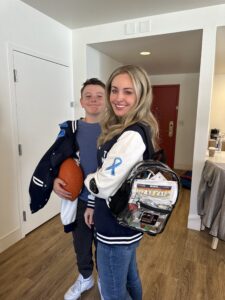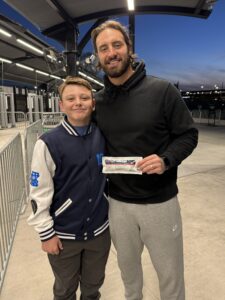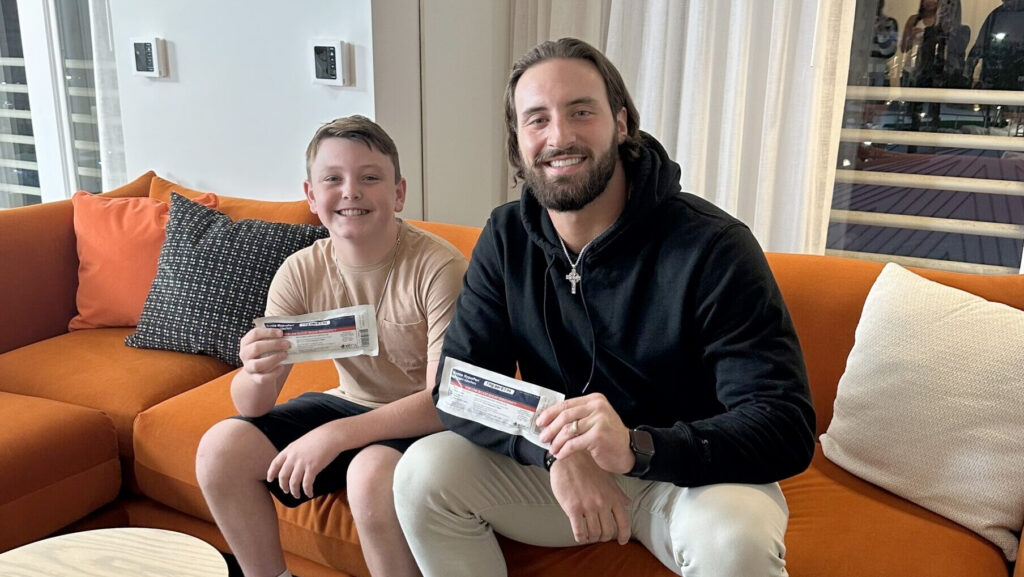Tackling Life With Type 1 Diabetes: Shiloh Scores Big on His ‘Diaversary’
Learn how the Let’s Talk Lows campaign is helping young athletes push the limits of diabetes
As we close out National Diabetes Awareness Month, we wanted to share the powerful story of 14-year-old Shiloh Wilmoth,  whose passion for football would not be sidelined by a diagnosis of type 1 diabetes (T1D) at age 4. Through his determination and the support of his family, Shiloh has persevered as a star quarterback in his local league until recently. Unfortunately, the fear of hypoglycemia and a lack of understanding of how to help someone experiencing a low blood sugar event have caused concern on his team, and he was recently benched. As you can imagine, this has been a difficult blow for Shiloh, as he loves playing football. This wasn’t an isolated event, either, as Shiloh has often been counted out for living with diabetes and has spent years working to prove himself.
whose passion for football would not be sidelined by a diagnosis of type 1 diabetes (T1D) at age 4. Through his determination and the support of his family, Shiloh has persevered as a star quarterback in his local league until recently. Unfortunately, the fear of hypoglycemia and a lack of understanding of how to help someone experiencing a low blood sugar event have caused concern on his team, and he was recently benched. As you can imagine, this has been a difficult blow for Shiloh, as he loves playing football. This wasn’t an isolated event, either, as Shiloh has often been counted out for living with diabetes and has spent years working to prove himself.
Shiloh recently got the surprise of a lifetime when he met his hero, professional football player Noah Gray, who also lives with T1D, on November 26 in Las Vegas. Their meeting was a touching reminder that diabetes does not have to stand in the way of big dreams.
See how Shiloh Is redefining the boundaries of diabetes
When Shiloh was diagnosed with T1D, his family worried he’d never live a “normal” life. They wondered if he’d be able to play sports or endure school without constant monitoring.
Shiloh’s mother Courtney recalls the fear associated with managing severe low blood sugar episodes. Once, when Shiloh’s blood sugar crashed dangerously low, she froze trying to assemble the outdated glucagon emergency kit — and felt helpless to protect her son.
Despite these fears, Shiloh was determined that diabetes would not sideline him. He became an advocate, educating coaches and teammates that T1D did not make him unreliable (even though a coach told him it did). He stood up to bullies and those who questioned his abilities. Though diabetes brought challenges, Shiloh believed it did not define him.
Gvoke HypoPen® (glucagon injection): An essential part of Shiloh’s diabetes toolkit
 To ensure that Shiloh has had a safety net, Courtney asked their healthcare provider about Gvoke HypoPen®, a prescription medicine used to treat very low blood sugar in adults and children ages 2 years and above with diabetes. It is the ready-to-use glucagon pen that anyone can administer.1,2 Because of its simple two-step administration (pull red, push yellow),1,3 Courtney feels hopeful — and no longer afraid of severe low blood sugar events.
To ensure that Shiloh has had a safety net, Courtney asked their healthcare provider about Gvoke HypoPen®, a prescription medicine used to treat very low blood sugar in adults and children ages 2 years and above with diabetes. It is the ready-to-use glucagon pen that anyone can administer.1,2 Because of its simple two-step administration (pull red, push yellow),1,3 Courtney feels hopeful — and no longer afraid of severe low blood sugar events.
Gvoke HypoPen® gave Shiloh confidence, too. He knows if his blood sugar crashes to a severe low during practice or games, his coach, teammates or friends are prepared to help treat him because they’ve been trained. Shiloh and Courtney never leave home without the rescue pen. It gives them peace of mind whether at school, football or a friend’s house.
For Shiloh and families like his, having ready-to-use glucagon they can rely on and that anyone can administer1,2 in an emergency can make a difference.
The power of representation: Shiloh meets his idol
 As a passionate football fan, Shiloh looks up to tight end Noah Gray. But it’s their shared T1D experiences that have made Noah an inspiration. Noah’s tenacity managing diabetes while excelling as a professional athlete gives Shiloh hope that his football dreams are achievable.
As a passionate football fan, Shiloh looks up to tight end Noah Gray. But it’s their shared T1D experiences that have made Noah an inspiration. Noah’s tenacity managing diabetes while excelling as a professional athlete gives Shiloh hope that his football dreams are achievable.
When Shiloh was surprised with tickets to see his favorite player play, he was over the moon. But nothing could top meeting Noah before the game. Seeing his idol carrying Gvoke HypoPen® brought Shiloh a powerful sense of connection. Noah shared how education, support and proper diabetes management tools enable him to thrive with T1D. Hearing Noah’s story, Shiloh felt more confident that diabetes would not sideline him either.
“Noah Gray is my hero because he has shown me nothing can stop you from doing what you love,” said Shiloh. “Meeting him gives me the courage I need to follow my dreams.”
The Let’s Talk Lows movement
Shiloh’s story is just one spotlighted by our “Let’s Talk Lows” campaign with Beyond Type 1. Together, we’re raising awareness about hypoglycemia, a common and potentially dangerous complication people with diabetes who take insulin or other medications known to cause low blood sugar.4
Severe low blood sugar, if untreated, can lead to tragic outcomes.5 Yet many patients and caregivers find existing glucagon kits cumbersome, causing critical delays.6 Our goal with Let’s Talk Lows is twofold:
- Educate patients, caregivers and the community that ready to use glucagon is a must-have. Rescue pens like Gvoke HypoPen® provide a simple-to-administer1,2 option to treat severe hypoglycemia.
- Inspire and empower people who live with diabetes to have hope. Noah Gray and Shiloh Wilmoth remind us that diabetes should not limit your passions or potential. With the right mindset, support and tools, anything is possible.
Shiloh’s story is an important reminder this Diabetes Awareness Month. His determination exemplifies that diabetes diagnoses do not have to derail big dreams. We hope it opens minds, touches hearts and rallies communities to champion people with diabetes. Because when we come together to understand, educate and encourage, we all thrive.
REFERENCES:
- Valentine V, Newswanger B, Prestrelski S, Andre AD, Garibaldi M. Human factors usability and validation studies of a glucagon autoinjector in a simulated severe hypoglycemia rescue situation. Diabetes Technol Ther. 2019;21(9):522-530
- Meyer JM, Devona MC. U.S. Survey investigating gaps between patients and specialists in the treatment of severe hypoglycemia and impressions of the ease-of-use of liquid-stable glucagon for subcutaneous injection. Int Arch Endocrinol Clin Res. 2021; 7(1):025. doi:10.23937/2572-407X.1510025
- Gvoke HypoPen [instructions for use]. Chicago, IL: Xeris Pharmaceuticals, Inc.
- McCall AL, Lieb DC, Gianchandani R, et al. Management of individuals with diabetes at high risk for hypoglycemia: an Endocrine Society clinical practice guideline. J Clin Endocrinol Metab. 2023;108(3):529-562.doi:10.1210/clinem/dgac596
- National Institute of Diabetes and Digestive and Kidney Diseases. Low Blood Glucose (Hypoglycemia). Updated July 2021. Accessed November 3, 2023. https://www.niddk.nih.gov/health-information/diabetes/overview/preventing-problems/low-blood-glucose-hypoglycemia
- Haymond MW, Liu J, Bispham J, Hickey A, McAuliffe-Fogarty AH. Use of Glucagon in Patients With Type 1 Diabetes. Clin Diabetes. 2019;37(2):162-166. doi:10.2337/cd18-0028
US-SM-GVK-23-00083(v3) 9/25
Indication
GVOKE (glucagon) is a prescription medicine used to treat very low blood sugar in adults and children ages 2 years and above with diabetes.
Important Safety Information
- Do not use GVOKE if you:
-
- Have a tumor in the gland on top of your kidneys, called a pheochromocytoma because of the risk of a substantial increase in blood pressure
- Have a tumor in your pancreas called an insulinoma because of the risk of low blood sugar
- Are allergic to glucagon or any inactive ingredient in GVOKE. Stop using GVOKE and seek immediate medical attention if you experience any symptoms of a serious allergic reaction such as rash, difficulty breathing, or low blood pressure
- Before using GVOKE, tell your doctor about all the medicines you take and your medical conditions, including if you have not had food or water for a long time (prolonged fasting or starvation), have low blood sugar that does not go away (chronic hypoglycemia), or have a history of a skin rash called necrolytic migratory erythema (commonly associated with glucagon-producing tumors)
- The most common side effects reported in adults are nausea, vomiting, swelling at the injection site, and headache
- The most common side effects reported in children are nausea, low blood sugar, vomiting, headache, abdominal pain, high blood sugar, pain or redness at injection site, and hives
- Inform caregivers on the Instructions for Use of GVOKE, and symptoms of severe hypoglycemia, which include unconsciousness and seizures or convulsions
- Store in original container until time of use, and at room temperature between 68°F to 77°F (20° C to 25° C)
- You are encouraged to report side effects of prescription drugs to the FDA. Visit http://www.fda.gov/medwatch or call 1-800-FDA-1088
Please talk to your doctor and see full Prescribing Information and Patient Information Guide for GVOKE.


